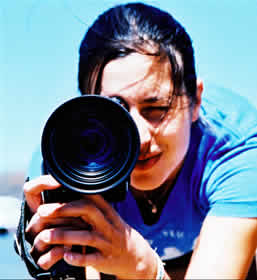 Writer/director Danielle Lurie graduated from Stanford University in 2000 with a BA in Philosophy. In it’s Summer 2005 issue, FILMMAKER MAGAZINE listed Danielle as being one of the 25 new faces of independent film.
Writer/director Danielle Lurie graduated from Stanford University in 2000 with a BA in Philosophy. In it’s Summer 2005 issue, FILMMAKER MAGAZINE listed Danielle as being one of the 25 new faces of independent film.
Danielle’s debut short film, IN THE MORNING, premiered at the 2005 Sundance Film Festival, and has won nine film festivals to date, including ‘Best Narrative Short’ at the Oscar qualifying Nashville Film Festival. On November 9, 2005, IN THE MORNING screened before members of the U.S. Congress during the Congressional Human Rights Caucus on Honor Killings, and would later screen before members of UNIFEM (United Nations Development Fund for Women).
Danielle spontaneously met and filmed the subject of her next short film, a documentary called ’81-Year-Old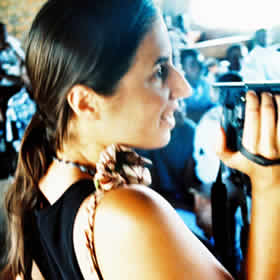 Sweethearts,’ on a plane flight from Los Angeles to Washington DC, which is now airing on Current TV, Al Gore’s television network.
Sweethearts,’ on a plane flight from Los Angeles to Washington DC, which is now airing on Current TV, Al Gore’s television network.
In March, 2007, Danielle filmed a documentary for ‘Invisible Children’ in Northern Uganda where she lived in an IDP (Internally Displaced People) Camp and filmed the adverse conditions there.
Today, Danielle is writing the feature-length version of IN THE MORNING and is also attached to write and direct a separate feature (based on a true story of wrongful imprisonment) with producer Jon Gordon. In addition, 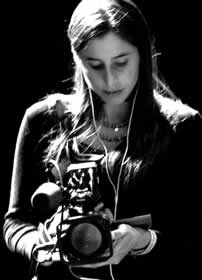 Danielle has a blind writing deal with a major studio; the subject matter of the scri pt is still to be determined.
Danielle has a blind writing deal with a major studio; the subject matter of the scri pt is still to be determined.
Currently, Danielle is directing a feature-length documentary that follows environmental activist Laurie David and rock star Sheryl Crow across the country on a campaign to promote awareness for, and solutions to, the issue of Global Warming. This film is in post-production.
Bijan Tehrani: Do you think filmmakers must focus more on social and political issues?
Danielle Lurie: Yes, I think filmmaking is an incredibly large microphone for social issues.
Bijan: Our world today is different after September 11; I personally think filmmakers must bring the debate on what has caused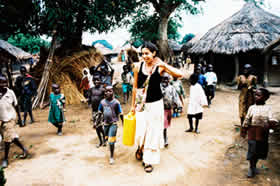 the wars and violence in our world, to the people. Don’t you think so?
the wars and violence in our world, to the people. Don’t you think so?
Danielle: I absolutely agree. Modern-day filmmakers have microphones that are so loud, and to be able to use that microphone for creating awareness for socially conscious subjects that would otherwise not get a chance to see the light of day…This is a power that should be used wisely.
Bijan: How much do you think a filmmaker can impose his/her views in a film? Do you think filmmakers should be more objective?
Danielle: I think that no filmmaker has any business making a movie that doesn’t have their own opinion in it; what’s the point of making a film that anyone else could have made? But I think there is a way to do this without being expositional; you can bring your own voice to something by letting the subject speak for itself. By the very nature that you’re choosing to tell a story on an issue, clearly that issue has some sort of resonance with you as a filmmaker.
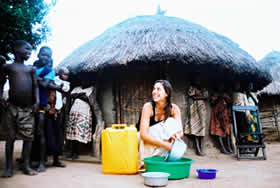 For example, my short film was about honor killings, and I didn’t think that film needed to come out and make a huge statement that honor killings were wrong. I felt that if I just showed that an honor killing happened, that the audience would take from it what they wanted to. At the time it was more important for me to just show that the honor killings were happening more than to overtly show my opinion. Where you are as a filmmaker at the time is a determining factor on whether or not you put your opinion very transparently in a film.
For example, my short film was about honor killings, and I didn’t think that film needed to come out and make a huge statement that honor killings were wrong. I felt that if I just showed that an honor killing happened, that the audience would take from it what they wanted to. At the time it was more important for me to just show that the honor killings were happening more than to overtly show my opinion. Where you are as a filmmaker at the time is a determining factor on whether or not you put your opinion very transparently in a film.
Bijan: Critics of some of the movies made about hunger and famine in Africa say that the repeated images can desensitize people. Have you ever had to deal with a problem like this?
Danielle: I have to deal with that very thing with myself right now. I just went and filmed a documentary in Northern Uganda with the NGO ‘Invisible Children’ where I lived in an IDP camp for ten days, and filmed my experience with three other filmmakers. Everywhere around me, people were starving, crying, dying, and were just miserable. The weather was sweltering and we lived in huts made of cow dung and I filmed everything – but to my horror what became immediately obvious was that none of the images I was capturing on my camera seemed new.
In a world today where people have seen so many images of cruelty – in Africa and other places in turmoil – and the media is so saturated with the horrors of the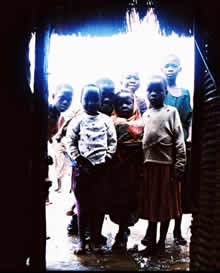 world, how do you show horror and get people to really notice? I think it is important for filmmakers to be filmmakers first and activists second and to really take a moment and think, “How do I tell this story differently?” Honestly, I don’t have the answer to that exactly, and I am struggling with this myself on the films I am working on.
world, how do you show horror and get people to really notice? I think it is important for filmmakers to be filmmakers first and activists second and to really take a moment and think, “How do I tell this story differently?” Honestly, I don’t have the answer to that exactly, and I am struggling with this myself on the films I am working on.
Bijan: One issue that is prominent today is that, after the Tsunami and with the war in Iraq, death is not a big enough issue to be mentioned in the media. If let’s say 20 people die, the media doesn’t deem it interesting enough to broadcast. I think that this is a problem that we are facing today. People seem to need a large number of casualties in order to pay attention to a tragic situation. Do you think that a different way of telling stories can help resolve this issue?
Danielle: Well, Stalin says that, “A single death is a tragedy, a million deaths are a statistic” and I think that effects how we should tell stories. I actually think that, today, our world is almost used to genocide and mass devastation; this is very unnerving. So, I think that the more individual a story is the better chance it has of gaining traction with mass audiences. If you are able to tell a story of just a few people as opposed to millions of people, audiences are able to wrap their heads around that better. That being said, I hear what your saying because it does seem that the small issues aren’t considered as much as the larger ones.
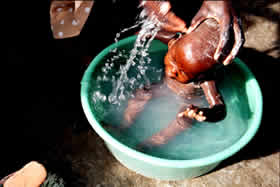 Bijan: Tell me a little about your new project that is about Global Warming and also tell us how effective you think projects like can be in curbing the effects of this issue.
Bijan: Tell me a little about your new project that is about Global Warming and also tell us how effective you think projects like can be in curbing the effects of this issue.
Danielle: I am actually really excited about this new project, and I think that it has a chance to create some change when it comes out. It’s about Laurie David who is a hero of mine and one of the leading global warming activists out there today (she produced ‘An Inconvenient Truth’) —and rock star Sheryl Crow, who took to the streets of America in a bio-diesel bus to campaign against global warming at colleges in the deep south. Laurie and Sheryl believe that every great social change begins at the college level, and that is why they took their tour to college kids. They said “Look: the solution is you guys, and you are the generation that has the chance to make a difference.” I think that they are on to something there in the sense that almost all causes are really in the hands of the youth of our world. Whether it is global warming or any other cause, targeting your films or your campaign for college kids is a great way to create change.
The film we’re making is not going to be something that you are going to roll your eyes at and go, “Okay, I’ve heard this before.” The plan is to offer some simple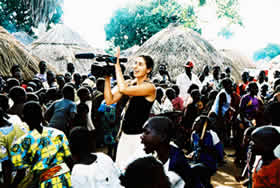 solutions to stop global warming, but also to tell the story of Laurie and Sheryl and their trip across the country and the people they meet. People aren’t going to have to go and sit through a preachy environmental film, but instead (I hope) they’re going to watch a movie that is really entertaining, and gives us hope that we can make a difference.
solutions to stop global warming, but also to tell the story of Laurie and Sheryl and their trip across the country and the people they meet. People aren’t going to have to go and sit through a preachy environmental film, but instead (I hope) they’re going to watch a movie that is really entertaining, and gives us hope that we can make a difference.
I think that hope is everything in the media, and in the world period. If we have no hope, we are never going to want to make a difference and we are never going to change our lives.
I didn’t use to be this way, I used to be adamant about staying true to reality, and only making films that show precisely what happened. But then you end up with a celluloid trophy in your closet of a film that nobody is watching because it is depressing and, most importantly, doesn’t offer any positive motivation to take a stance for change.
Bijan: Has Michael Moore, as someone who is making films on social and political issues, had any effects on you as a filmmaker? 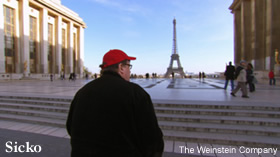 Danielle: Michael Moore is someone who I have learned a lot from – both what to do and what not to do. He is a filmmaker who really gets under your skin for better or for worse. He is clearly a filmmaker who has an opinion, and his films run a mix of being a documentary and a bit of a narrative. He will definitely put things in an order that helps highlight his point. I am personally more of a fly-on-the-wall filmmaker. My kind of documentaries are where real life actually explains itself best if it is allowed to do whatever it does. It is really important to watch Michael Moore’s films to and see the effects that they have and if a difference can be made. I learned something from Michael Moore when at the end of “Fahrenheit 911”, under this incredibly passionate music, he wrote “Do something” and then put up a website for people to go to to make a difference. I thought, “Wow!” If received correctly, this film can start a movement because it is telling someone what to do after they leave the theater. I think he definitely manipulates his stories, but as long as he is not claiming that he is telling a cinema verite story, he is allowed to do whatever he wants. I think people
Danielle: Michael Moore is someone who I have learned a lot from – both what to do and what not to do. He is a filmmaker who really gets under your skin for better or for worse. He is clearly a filmmaker who has an opinion, and his films run a mix of being a documentary and a bit of a narrative. He will definitely put things in an order that helps highlight his point. I am personally more of a fly-on-the-wall filmmaker. My kind of documentaries are where real life actually explains itself best if it is allowed to do whatever it does. It is really important to watch Michael Moore’s films to and see the effects that they have and if a difference can be made. I learned something from Michael Moore when at the end of “Fahrenheit 911”, under this incredibly passionate music, he wrote “Do something” and then put up a website for people to go to to make a difference. I thought, “Wow!” If received correctly, this film can start a movement because it is telling someone what to do after they leave the theater. I think he definitely manipulates his stories, but as long as he is not claiming that he is telling a cinema verite story, he is allowed to do whatever he wants. I think people need to hear other opinions and Michael Moore is very clear that his films are his opinion. I think he is bold and daring. I am not the same filmmaker as him; not necessarily because I don’t want to be, but because I am not inherently. I will definitely go see “Sicko” this week.
need to hear other opinions and Michael Moore is very clear that his films are his opinion. I think he is bold and daring. I am not the same filmmaker as him; not necessarily because I don’t want to be, but because I am not inherently. I will definitely go see “Sicko” this week.
Bijan: I think he put documentary filmmaker back on the map again with audiences and attracted more attention towards important political and social issues.
Danielle: I agree because I think that he showed filmmakers that documentaries can be a tool for social change. Other filmmakers have done this too, but Moore has been very loud about it. His films inspire filmmakers to unlock their minds and motivate them to think that they can make more than an art piece; that they can actually influence an audience to do something differently. I get something from that, and I am sure he inspired something in me as a filmmaker to get out there and make movies that matter a bit more.
Bijan: There are 2 filmmakers who made a film about Michael Moore and they claim that he is exaggerating and making up some of the facts presented in his films. What do you think about that kind of filmmaking? A lot of people call this a waste of time.
Danielle: I think it is fine for one filmmaker to make a film and another to filmmaker make a rebuttal—that’s just freedom of speech. By all means, let’s explore all different sides of an issue. If someone is really enraged by a film that someone else made, they have every right to make a film to try to dispute what was said in the original film. It’s not what I would spend my time doing, but maybe if I was so adamantly opposed to what one filmmaker did in their film, I would do the same. It is a matter of how much you care about something.
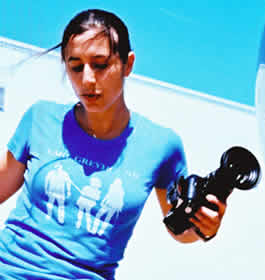 Which brings me to a point, I don’t think you can do any film insincerely and have it be good. I wouldn’t make a film on a socially conscious issue just because it’s a socially conscious issue. I think that the issue really needs to “speak” to a filmmaker in order to make a really good film about it. I think a lot of filmmakers are just hopping on the bandwagon of socially conscious film making, and they are just making films because they know people will watch them because they have an issue. It is important to wait until an issue really speaks to you to tell that story. So if these filmmakers who are attacking Michael Moore really care about that, then they should go and make their movie. If they don’t really care about it and are doing the film as more of a gimmick, then I don’t believe in that as a film. First and foremost, I think you should be passionate about any story you are telling. Even if it is a romantic comedy, sincerity jumps off the screen and—worse—insincerity jumps off it much faster.
Which brings me to a point, I don’t think you can do any film insincerely and have it be good. I wouldn’t make a film on a socially conscious issue just because it’s a socially conscious issue. I think that the issue really needs to “speak” to a filmmaker in order to make a really good film about it. I think a lot of filmmakers are just hopping on the bandwagon of socially conscious film making, and they are just making films because they know people will watch them because they have an issue. It is important to wait until an issue really speaks to you to tell that story. So if these filmmakers who are attacking Michael Moore really care about that, then they should go and make their movie. If they don’t really care about it and are doing the film as more of a gimmick, then I don’t believe in that as a film. First and foremost, I think you should be passionate about any story you are telling. Even if it is a romantic comedy, sincerity jumps off the screen and—worse—insincerity jumps off it much faster.
Bijan: What do you think about today’s reality shows? I personally believe they have nothing to do with reality. Do you think there will be any chance for filmmakers to get into making reality TV shows that can help bring change to society?
Danielle: I think that the art form of reality TV, in its most sincere objective nature, is a really exceptional format of film making. I think it is not being channeled the right way today and it is being manipulated. I wouldn’t call 99% of the reality TV shows out there “Reality TV” because they are very much doctored, changed, and posed. You have to question the motives of those who appear on the shows, and those making the shows. There are some reality shows which, when done right, really can give you an insight into human nature. For example, the show “30 Days” is a very special reality TV show. It depicts how people from different cultures can live in each others shoes. This is something that can help me, as a viewer, grow as a person. I do think that reality television has a strong chance of actually being fantastic television, but only if it is being done for the right reasons. There are hardly any shows that I would watch that are reality TV based today.
Bijan: Is there anything else you’d like to say?
Danielle: Hopefully the films of today can bring fruitful change with them, because our world – and government – is in need of some serious change. Maybe then, we can also do films that are just poetry again. It has almost become a luxury to do just an art piece. Right now, if I am going to spend months and years of my life on a film, hopefully there will be an end result that will benefit someone else somewhere at some point. It would be nice to spend sometime on art for arts sake too, but I do think that, right now, we are in a really fragile state where we don’t have time to just create art; we only have time to create change.
